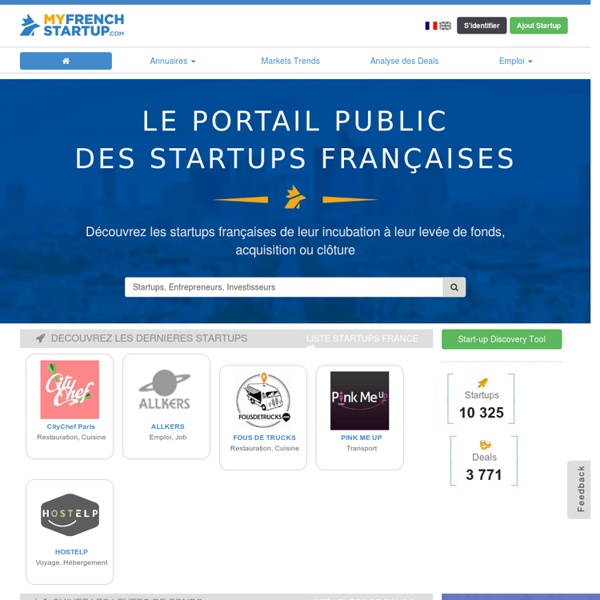



Well Done Stuff ! France - Le site emploi des startups The Hottest Startup Hubs in Europe - Job Coconut Blog Thinking of working in a startup? If so, we at Job Coconut suggest looking into these European cities! Which city do you think can give Silicon Valley a run for its money? Berlin: A decade ago Berlin’s mayor Klaus Woweralt tried to attract creative types to Berlin declaring “Berlin ist arm, aber sexy” (poor but sexy). The city has already produced some famous startup success stories such as music sharing service SoundCloud and games company Wooga. Want to work in Berlin? Tel Aviv According to the Startup Genome Project’s latest tally, Israel’s Tel Aviv ranked as the number two startup ecosystem in the word. Tech companies in Tel Aviv refer to themselves as “Startup Nation”, based on an eponymous book that cites Israel as having more companies on NASDAQ than any country outside the U.S., and more than Europe and India combined. The ecosystem is supported by investors, many of whom are members of the Jewish diaspora. London Interested in working in London? Paris Barcelona Dublin Moscow Amsterdam
JeSuisPatron.Com Silicon Sentier Euro Entrepreneurs: "Either Come to the Valley or Stay Home and Play with the Losers" Every week there seems to be another Brit announcing that they’re leaving London’s startup community and heading west to Silicon Valley. Meanwhile, those who have already made the jump frequently head home to offer advice and encouragement to those left behind on how to follow suit. But with the decline of Silicon Valley and the rise of emerging markets, is moving to San Francisco still the right thing to do for Euro entrepreneurs? We start by asking if he feels like he’s abandoning his homeland… Video below. J'ai Une Bonne Idée ! | Partagez vos idées, commentez celle des autres Co-Founder Equity Calculator some-french-entrepreneurs-say-au-revoir Photo Guillaume Santacruz, an aspiring French entrepreneur, brushed the rain from his black sweater and skinny jeans and headed down to a cavernous basement inside Campus London, a seven-story hive run by Google in the city’s East End. It was late on a September morning, and the space was crowded with people hunched over laptops at wooden cafe tables or sprawled on low blue couches, working on plans to create the next Facebook or LinkedIn. A year earlier, Mr. He decided that he would try again. “A lot of people are like, ‘Why would you ever leave France?’ In the Campus London basement, Mr. From 80 to 90 percent of all start-ups fail, “but that’s O.K.,” said Eze Vidra, the head of Google for Entrepreneurs Europe and of Campus London, a free work space in the city’s booming technology hub. That is the kind of thinking that drew Mr. Mr. Some wealthy businesspeople have also been packing their bags. After denying that there was a problem, Mr. Taxes, Frustration, More Taxes Mr. Mr. Mr. Mr.
Le monde est riche d'id?es 2014-07-24 - Arnaud Bonnefond explique l'innovation collaborative L'expertise d'Arnaud est suffisamment reconnue dans le milieu pour qu'on lui offre la chance de s'exprimer sur le blog expert de l'Apec. Il présente dans ce billet les différentes formes que revêt l'innovation collaborative, du stade le plus élémentaire au plus abouti, sur lequel vous vous trouvez actuellement ! Notez que vous êtes tout à fait libres de partager sa réflexion avec votre entourage... Le billet en question « On entend par intelligence collective les capacités cognitives d’une communauté résultant des interactions multiples entre ses membres » (source Wikipédia). En tant qu’individu, se pose la question de l’intérêt de participer à ces mouvements collectifs. La plus célèbre et la plus utilisée est sans nul doute le réseau social ! Pas très performant tout cela, mais le réseau social contribue tout de même à une forme de paix et de reconnaissance sociale en agissant comme catalyseur de l’expression collective.
5 Principles of Innovation Are innovators born or made? Surely, those who spawn ideas that change the world are special – different then the rest of us. Take one look at an Einstein, a Henry Ford or a Steve Jobs and it seems that they were bequeathed with something unique. Yet many others also have flair and surety and never accomplish anything of note. 1. Peter Drucker once wrote, “Effective innovations start small. Take a look at any really, really big thing and, inevitably, it modest origins. Yet, the great thing about thinking small is that you can risk failure, because failure is sustainable. The absolutely worst thing you can do is pile on a bunch of up-front costs that push the break-even point far into the future. 2. Ever since Clayton Christensen published The Innovator’s Dilemma, the idea of disruptive innovation has become super sexy. What people tend to miss (surprisingly few who blather on about the subject actually have read Christensen’s work) is that disruptive innovation is crappy. 3. 4. 5.
Les Entrepreneurs Français à Londres